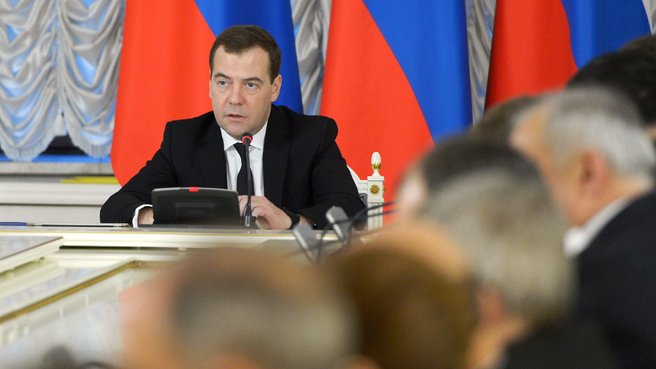Meeting of the Government Commission on the Socio-Economic Development of the North Caucasus Federal District.
Dmitry Medvedev’s opening remarks:
Today we have a meeting of the Government Commission on the Socio-Economic Development of the North Caucasus Federal District.
One of the problems that we regularly discuss is a key issue today. I’m referring to the fuel-and-energy sector. A year ago, on 10 December 2012 I held a special conference on this issue. Although much has been done, in particular, by law-enforcement agencies, I must admit that not all measures were effective enough and there are still problems in this area.
The Caucasus is one of Russia’s historical oil centres but the scale of production is falling because of the depletion of major deposits. Regrettably, the district does not have quality oil refineries. For the most part, oil is processed by over 80 mini-refineries. Some of them do not have proper licenses, violate industrial safety requirements. Let’s be straight about this – in many cases they are simply shadow businesses, syphoning off electricity, as well as oil and gas. <…>
Dmitry Medvedev: “The district has vast potential for this. The surplus of electricity allows the district to transfer it to adjacent areas, for instance the Southern Federal District. According to the plan for the development of Russia’s grids, the capacity of electric power stations in the district is expected to increase by 15% as compared to 2012 – to almost 8 GW".
Law-enforcement bodies are working hard, but police and prosecutor measures alone are not enough, important as they are.
Now I’d like to say a few words about electricity generation. The district has vast potential for this. The surplus of electricity allows the district to transfer it to adjacent areas, for instance the Southern Federal District. According to the plan for the development of Russia’s grids, the capacity of electric power stations in the district is expected to increase by 15% as compared to 2012 – to almost 8 GW. However, the economy of the North Caucasus Federal District and its residents are unlikely to notice this increase because of the conditions of the grids. They are in need of repair and the amount of electricity lost is huge. They are not reliable. This is why some areas, especially those difficult-to-access, simply do not receive enough electricity.
Finally, we should discuss the sensitive issue of debts for energy supplied. Following last year’s meeting we established a Government working group on outstanding payments. Owing to the working group’s efforts, all budget-funded organisations are now paying for all their electricity. In some republics, for instance Kabardino-Balkaria and Karachayevo-Circassia, all customers are paying their electricity bills in full.
Dmitry Medvedev: “We must establish a transparent and clear-cut system of payments and end any surrogates and cash payments. Ingushetia has a proposal to form a payment centre that will help put an end to this mess”.
Nevertheless, the North Caucasus Federal District still has problems with electricity payments. Its guarantee suppliers owe 24 billion roubles (an increase by almost five billion roubles) to the wholesale market. Far from decreasing, this debt is growing.
What should be done about this?
First, we must establish a transparent and clear-cut system of payments and end any surrogates and cash payments. Ingushetia has a proposal to form a payment centre that will help put an end to this mess. We can also look at other proposals.
Second, mediators often deliberately declare bankruptcy so as not to pay for electricity supplied. This is a crime and we must put things in order here.
Now a few words about gas supplies. On the average, provision of gas supply stands at almost 90%. This is very good, but the district’s customers owe almost 50 billion roubles to gas suppliers. This is almost half the national debt on gas supplies.
There is still a huge gap between the amounts of supplied gas and sold gas. This is primarily due to the use of self-made gas equipment that is not registered anywhere, not put into operation officially and poses a threat to the safety of people and buildings. This is also due to the technical condition of gas distribution lines and large-scale illegal tapping of gas.
Dmitry Medvedev: “Mediators often deliberately declare bankruptcy so as not to pay for electricity supplied. This is a crime and we must put things in order here”.
We must toughen control over gas consumption, put things in order in gas accounting, stop illegal gas tapping and end the use of uncertified gas equipment.
I’d like to emphasise that much depends on your will and personal responsibility here (I’m referring to regional governors). Timely payments and sorting out the gas and electricity sector will testify to the effective performance of regional authorities and will be taken into account in their rating.
<…>












